

How to Lead Change Management. College presidents predict 4 new institutional models for higher-ed. Presidents say these new models could be the future of all colleges and universities in the next decade A new think-tank-esque collection of leading college and university presidents last year came together to discuss the trends and disruptions shaping higher education thanks to new technologies and the evolving global economy.
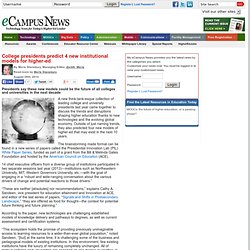
Outside of just naming trends, they also predicted four new models of higher-ed that may exist in the next 10 years. The brainstorming made formal can be found in a new series of papers called the Presidential Innovation Lab (PIL) White Paper Series, funded as part of a grant from the Bill & Melinda Gates Foundation and hosted by the American Council on Education (ACE). 14 chief executive officers from a diverse group of institutions participated in two separate sessions last year (2013)—institutions such as Northeastern University, MIT, Western Governors University, etc. Leadership in shared governance. When Anthony Tricoli arrived at Georgia Perimeter College (GPC) as its new president nearly five years ago and started talking about a shared-governance strategy to improve the college, some folks rolled their eyes.
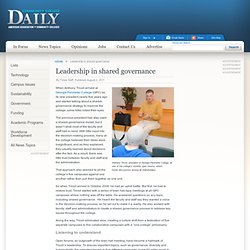
The previous president had also used a shared-governance model, but it wasn’t what most of the faculty and staff had in mind. With little input into the decision-making process, many at the college believed their ideas were insignificant, and as they explained, they usually learned about decisions after the fact. As a result, there was little trust between faculty and staff and the administration. That approach also seemed to pit the college’s five campuses against one another rather than pull them together as one unit. How President Stephen Mittelstet Runs Richland College Like a Business. It’s tempting to call Dr.
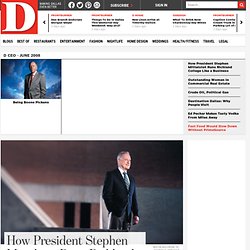
Stephen K. Mittelstet the Pied Piper of quality control in education. After all, he led Dallas’ Richland College to a Malcolm Baldrige National Quality Award, which most people associate with engineering and manufacturing, not education. www.aacc.nche.edu/Resources/competencies/Documents/compentenciesforleaders.pdf. AACC_Core_Competencies_web. How to build a strong internal fundraising machine. Editor’s note: This is an excerpt from an article in the February/March edition of the Community College Journal, the bimonthly magazine of the American Association of Community Colleges.
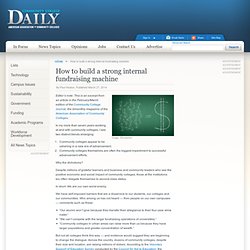
In my more than seven years working at and with community colleges, I see two distinct trends emerging: Community colleges appear to be ushering in a new era of advancement.Community colleges themselves are often the biggest impediment to successful advancement efforts. Why the dichotomy? Despite millions of grateful learners and business and community leaders who see the positive economic and social impact of community colleges, those at the institutions too often relegate themselves to second-class status. The 7 Things Successful People Never Say. Book offers campus leaders advice on crisis preparation and response. A devastating tornado touches down, claiming the lives of six university students and affecting more than 1,200 without homes.
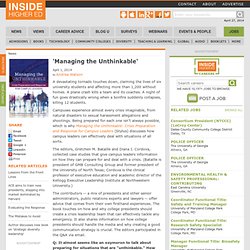
Tiger Woods - Rainy Days. Edu-CC%20Leadership%20Final%20Executive%20Summary. Chomsky: How America's Great University System Is Getting Destroyed. Essay says that unbundling the faculty role may not be a bad idea. Of the litany of offenses commonly attributable to for-profit education, MOOCs, and other forms of distance education, one of the most incendiary is the thoughtless “unbundling” of the faculty role from the holy trinity of teaching, research, and service.
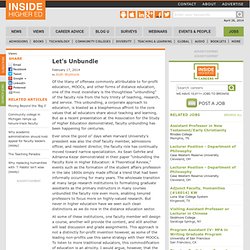
This unbundling, a corporate approach to education, is blasted as a blasphemous affront to the core values that all educators share about teaching and learning. But as a recent presentation at the Association for the Study of Higher Education demonstrated, faculty unbundling has been happening for centuries. Ever since the good ol’ days when Harvard University’s president was also the chief faculty member, admissions officer, and resident director, the faculty role has continually moved toward narrow specialization. Advice for New Community-College Presidents, Part 2 - Do Your Job Better. By Rob Jenkins A report from the Kresge Foundation, released in June, found that 40 percent of community-college presidents plan to retire in the next five years—and that doesn't count the ones who stepped down at the end of 2012-13.
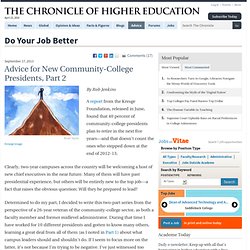
Stuck on an escalator. CEP_Final_Report. The Cyclical Issues: A Conversation with George Boggs - Community College Week - The independent voice servicing community, junior and technical colleges. Reprinted with permission from the College Brain Trust The College Brain Trust sought Boggs' point of view on some of the key issues that seem to never go away at community colleges, issues that are cyclical, reoccurring and only partially resolved.
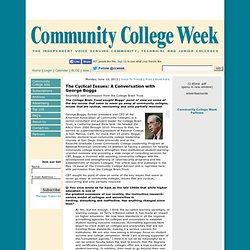
George Boggs, former president and CEO of the American Association of Community Colleges, is a senior consultant and project leader for College Brain Trust, a California-based think tank. He headed the AACC from 2000 through 2010. Previous to that, he served as superintendent/president of Palomar College in San Marcos, Calif., for more than 15 years. Boggs teaches doctoral-level community college leadership courses at San Diego State University and at the Roueche Graduate Center Community College Leadership Program at National American University. Not Dressing the Part, and Other Interview Mistakes - Manage Your Career. Dennis M. Barden. Top 10 Mistakes in Recruiting Administrators - Run Your Campus. Career services (as it now exists) must die, new report argues.
Well, not die, exactly.
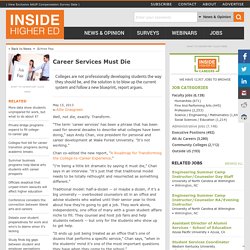
Transform. Hiring Wisdom: Top 10 Ways to Guarantee Your Best People Will Quit. Here are 10 ways to guarantee that your best people will quit: 10.
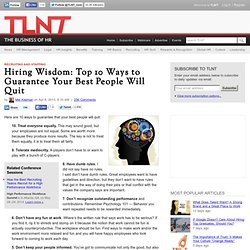
Treat everyone equally. 10 Things Really Amazing Employees Do. As a longtime employer of dozens, I was always grateful to have good employees. It takes a lot to recruit and maintain top talent. Every once in a while special employees come along that just really seem to get it. They drive the entire company forward in ways that were unimaginable. Employees leave managers, not companies. 6 Habits of Remarkably Likable People. When you meet someone, after, "What do you do? " Seeking a Different Sort of Leader - Run Your Campus. By Dennis M. Barden What does it mean to be a leader in higher education? /// K-State Football's 16 Goals ///
3 Higher Ed Innovation Leadership Skills I Need to Develop. 8 Habits of Remarkably Successful People. Postsecondary Education: The Case for Systemic Change. Jamie P. Merisotis, President & CEO, Lumina Foundation Luncheon keynote speech, Skilled Workforce State Summit, Minnesota Chamber of Commerce, St. Paul, MN. 50 Life Secrets and Tips.
Why Lies Often Stick Better Than Truth - Percolator. There is no good reason to believe vaccines cause autism. Sonar6 Color Paper: How Angry Birds made me a better manager. All managers should be making use of individuals' talents, but great managers play a bigger game; they understand the potential of entire teams. Good Managers Lead Through a Team - Linda Hill & Kent Lineback. The 8 Signs That You Have an Extraordinary Boss.
How To Be a Great Leader (in under 300 words) The six psychological factors that make a really great leader. Want to lead others?